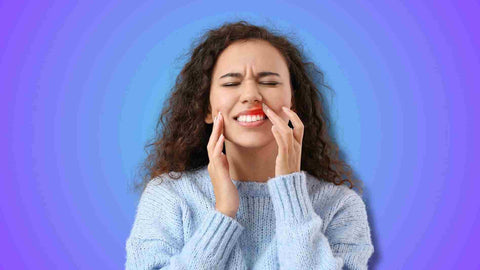Does Whiskey Stain Teeth?
Yes, whiskey can stain teeth because of its dark color and acidic nature.
The aging process of whiskey in charred new oak barrels contributes to its rich brown color and complex flavors, which can also cause tooth staining.
Dark liquors contain chromogens that adhere to tooth enamel, resulting in discoloration. The acidity can weaken enamel, making it more susceptible to staining, and the high sugar content in whiskey can contribute to plaque buildup.
Moreover, mixing whiskey with dark sodas or other colored beverages can intensify staining.
To minimize the risk of staining, it’s advisable to maintain good oral hygiene practices, such as brushing and rinsing after consuming whiskey.
Overall, enjoying whiskey in moderation is generally safe, but being mindful of its potential effects on dental aesthetics is important for maintaining a bright smile.
Keep reading to learn everything you need to know about whiskey and how it can affect your oral health.
What causes whiskey to stain teeth?

Whiskey can stain teeth mainly due to its dark pigments and acidic nature.
Chromogens present in whiskey adhere to tooth enamel, leading to discoloration over time.
Studies indicate that dark liquors like whiskey are particularly notorious for causing stains, especially with regular consumption.
Additionally, whiskey often contains sugars that can contribute to plaque buildup, exacerbating staining and increasing the risk of tooth decay.
The acidity of whiskey can weaken enamel, making it more susceptible to staining from various food and drink sources.
Furthermore, when whiskey is mixed with dark sodas or other colored beverages, the combined effects can intensify tooth discoloration.
Heavy drinking, as defined by the CDC, can significantly increase the risk of tooth decay, gum disease, and oral cancer, further exacerbating whiskey's staining effects.
Therefore, to mitigate these effects, maintaining good oral hygiene and drinking water alongside whiskey can help reduce the risks of staining.
Benefits of Whiskey for Your Teeth
Whiskey may offer some potential benefits for oral health, mainly due to its analgesic and antiseptic properties.
The high alcohol content in whiskey can act as a temporary numbing agent, providing relief for toothaches when applied directly to the area.
Additionally, whiskey's antiseptic qualities can help reduce bacteria in the mouth, potentially preventing infections around painful teeth.
Research indicates that ethanol, the type of alcohol found in whiskey, possesses broad-spectrum antimicrobial properties, which can help maintain oral hygiene when used judiciously.
However, it's essential to note that these benefits are temporary and should not replace professional dental care.
While moderate consumption of whiskey might offer short-term relief, excessive drinking can lead to negative effects on dental health, such as causing enamel erosion and staining.
Therefore, while whiskey can provide some immediate benefits for tooth discomfort, it should be used cautiously and as a complement to regular dental practices.
Side Effects of Whiskey for Your Teeth

Consuming whiskey can have several negative effects on dental health.
First, whiskey is highly acidic, which can erode tooth enamel over time, making teeth more susceptible to decay and sensitivity.
The sugars present in whiskey can contribute to plaque buildup, providing a food source for harmful bacteria that lead to cavities. Moreover, excessive alcohol consumption is linked to a higher incidence of dental caries and tooth loss.
A study found that individuals with alcohol dependency had significantly more decayed teeth than non-drinkers.
Additionally, whiskey can cause dry mouth, reducing saliva production, which is crucial for neutralizing acids and washing away food particles.
Heavy drinking can exacerbate these negative effects, increasing the risks of enamel erosion, tooth decay, and gum disease.
Overall, while moderate whiskey consumption may not pose immediate risks, excessive intake can lead to serious dental issues, including enamel erosion, increased decay, staining, and gum disease.
How does alcohol affect our oral health?

Whether through isopropyl alcohol or ethyl alcohol, alcohol consumption can have several negative effects on oral health, impacting everything from your teeth to your gums and the overall balance of your mouth’s ecosystem.
Let’s explore some of the key effects of alcohol.
Dry Mouth
Alcohol has a diuretic effect, which can lead to dehydration and reduced saliva production. Saliva is crucial for neutralizing acids in the mouth, washing away food particles, and preventing decay.
Heavy drinking can significantly reduce saliva production, leading to a dry mouth that promotes cavity-causing bacteria and increases the risk of tooth decay.
Therefore, a dry mouth environment is more conducive to bacterial growth, increasing your risk of tooth decay and gum disease.
Tooth Decay and Gum Disease

Many alcoholic beverages contain high levels of sugar which contributes to tooth decay by feeding the harmful bacteria in your mouth.
Further, the acidic nature of some drinks can also erode tooth enamel, making teeth more susceptible to decay. Heavy drinking can exacerbate the effects of sugar and acidity in alcoholic beverages, leading to a higher risk of tooth decay and gum disease.
Additionally, alcohol’s impact on saliva production can affect the health of your gums, potentially leading to gum disease, as a dry mouth supports the conditions in which harmful bacteria thrive.
Oral Cancer Risk
Regular and excessive alcohol consumption is a known risk factor for oral cancer.
Heavy drinkers face a significantly higher risk of developing oral cancer, especially when combined with smoking, as alcohol makes oral tissues more vulnerable to the harmful effects of tobacco. The risk increases significantly for those who both smoke and drink, as alcohol can make the oral tissues more susceptible to the harmful effects of tobacco.
Staining
Certain alcoholic drinks, like whiskey, can stain teeth due to their color pigments (chromogens) and acidity, which etches the teeth and makes them more prone to surface stains.
Heavy drinking can intensify the staining effects of whiskey, as frequent consumption without proper dental care increases the risk of tooth discoloration.
Can I drink alcohol after teeth whitening?

It is generally recommended to avoid alcohol for at least 24 to 48 hours after undergoing teeth whitening.
During this initial period, your teeth are more porous and susceptible to staining due to the whitening process, which opens up the enamel.
Consuming alcohol, especially dark or acidic beverages like red wine or whiskey, can lead to discoloration and undermine the results of your whitening treatment.
Additionally, alcohol can dehydrate your mouth, reducing saliva production, which is essential for maintaining oral health and preventing plaque buildup.
The acidity in alcoholic drinks can also weaken enamel, increasing sensitivity and the risk of further staining.
If you choose to drink alcohol after this waiting period, opt for lighter-colored beverages and consider using a straw to minimize contact with your teeth.
Always maintain good oral hygiene practices to prolong the effects of your whitening treatment.
The Worst Alcoholic Drinks for Your Teeth

Certain alcoholic drinks can be particularly harmful to your teeth due to their high acidity, sugar content, and potential to cause dehydration.
For example, whiskey and coke is one of the worst drinks for your teeth, as it combines high acidity levels, dark colors, and a low pH level of 2.5, all of which contribute to enamel erosion.
Similarly, vodka cranberry is another harmful choice, as its deep, stain-causing color and high sugar content, more than a can of soda can lead to tooth decay.
Additionally, red wine, with its acidity, tannins, and tendency to bind color to enamel, is notorious for staining teeth.
Beer, while not as acidic, can still contribute to tooth decay and gum disease, particularly if consumed excessively.
Moreover, heavy drinking amplifies the negative effects of these beverages, increasing the risk of tooth decay, gum disease, and staining.
Cocktails and drinks made with sugary mixers are especially problematic, as they often contribute to cavities and decay.
To protect your teeth while drinking, opt for beverages with lower sugar content, stay hydrated by drinking plenty of water, and maintain good oral hygiene afterward.
Comparing Whiskey to Other Alcoholic Drinks
When it comes to oral health, whiskey is not the worst offender among alcoholic drinks.
In fact, some expert opinions suggest that whiskey may be less damaging to teeth than other spirits like vodka or rum.
This is because whiskey typically contains fewer sugars and additives compared to many mixed drinks and cocktails.
However, it’s essential to remember that excessive consumption of any alcoholic beverage can lead to oral health problems, including tooth decay, gum disease, and oral cancer.
Moderate drinking is key to minimizing the risks associated with whiskey and other alcoholic drinks.
The Centers for Disease Control and Prevention (CDC) defines moderate drinking as up to one drink per day for women and up to two drinks per day for men.
By adhering to these guidelines, you can enjoy whiskey while reducing the potential negative impacts on your oral health.
Tips for Enjoying Whiskey Responsibly

When enjoying whiskey responsibly, it's important to also consider your oral health. Alcohol can dry out your mouth, reducing saliva production, which is essential for washing away harmful bacteria.
To minimize the risks, always drink water alongside whiskey to stay hydrated and maintain saliva flow.
It's also helpful to enjoy whiskey in moderation, as excessive alcohol consumption can contribute to tooth decay and gum disease over time.
Eating while drinking, especially foods high in fiber, can help buffer the impact on your teeth.
Afterward, make sure to brush and floss your teeth, but wait at least 30 minutes to avoid damaging your enamel, which may be softened by the acidity of the whiskey.
By balancing your enjoyment of whiskey with proper oral care, you can reduce the risk of developing oral health issues.
How to Prevent Alcohol from Affecting Your Teeth

Protecting your teeth from the effects of alcohol involves mindful habits and a commitment to oral hygiene.
Start by staying hydrated, especially when you’re enjoying a drink. Alcohol tends to dry out your mouth, reducing the saliva that’s crucial for neutralizing harmful acids and washing away food debris.
So, by drinking water alongside your alcoholic beverages, you help maintain saliva flow and dilute any acids, sugars, and staining agents present in your drink.
Avoiding heavy drinking can help maintain saliva production and reduce the risk of tooth decay, gum disease, and staining.
Additionally, make smarter choices when it comes to selecting your drinks. Opt for those with lower sugar content and acidity, like vodka, to minimize the risk of tooth decay and enamel erosion.

If you do indulge in a sugary cocktail or acidic red wine, try not to sip it over an extended period, as this prolongs your teeth’s exposure to these harmful elements.
Then, after enjoying your drink, take a moment to rinse your mouth with water or alkaline mouthwash. This simple step can significantly reduce the potential damage by neutralizing acids and flushing away residues that could lead to stains or decay.
However, resist the urge to brush your teeth immediately after drinking, particularly if you’ve had something acidic. This includes not brushing your teeth after drinking tea. Brushing too soon can spread the acid more evenly across the surfaces of your teeth, exacerbating enamel wear.
Instead, wait at least 30 minutes, allowing your saliva to naturally restore the mouth’s pH balance.
Finally, remember that maintaining a consistent oral hygiene routine, including brushing twice daily with nano hydroxyapatite toothpaste and flossing with expandable floss, is key.
Final Thoughts

Whiskey can stain teeth, but the risk can be reduced by practicing good oral hygiene and drinking responsibly.
Being aware of the risks associated with excessive alcohol consumption can help reduce the risk of oral health problems.
Enjoying whiskey in moderation and taking steps to protect your teeth can help you enjoy your favorite drink while maintaining good oral health.
Frequently Asked Questions
Does whiskey make your teeth yellow?
Yes, whiskey can make your teeth yellow over time. The dark pigments in whiskey can stain tooth enamel, especially with frequent consumption. Additionally, whiskey’s acidity can weaken enamel, making it easier for stains to set in. To minimize yellowing, drink water alongside whiskey and maintain good oral hygiene.
What alcohol does not stain teeth?
Clear spirits like vodka cranberry, gin, and white rum are less likely to stain teeth compared to darker alcoholic beverages. These drinks typically contain fewer pigments and less acidity, reducing the risk of discoloration. Additionally, drinks that are mixed with non-colored mixers, such as soda water or tonic water, are also safer options for maintaining a bright smile. However, moderation and good oral hygiene are still essential to protect your teeth.
Do I need to brush my teeth after whisky?
Yes, it's a good idea to brush your teeth after drinking whiskey, but wait about 30 minutes before doing so. This waiting period allows your enamel, which may be temporarily softened by the acidity in whiskey, to re-harden. Brushing too soon could damage the enamel. In the meantime, rinsing your mouth with water can help wash away residue and minimize the risk of staining.
Can I drink whiskey after teeth whitening?
It's best to avoid drinking whiskey for at least 48 hours after teeth whitening. After the whitening process, your enamel can be more porous and sensitive, making your teeth more susceptible to staining from dark beverages like whiskey. Drinking water or clear liquids during this time is recommended to help maintain your whitening results. Once the initial period has passed, you can enjoy whiskey in moderation while taking care to maintain good oral hygiene.
Does alcohol damage tooth enamel?
Yes, alcohol can damage tooth enamel. Many alcoholic beverages, especially those that are acidic, can erode enamel over time, making teeth more vulnerable to decay and sensitivity. Additionally, alcohol can reduce saliva production, which is crucial for neutralizing acids and protecting enamel. Regularly consuming acidic or sugary alcoholic drinks increases the risk of enamel erosion, so moderation and good oral hygiene are essential to minimize potential damage.
How can I protect my teeth when drinking alcohol?
To protect your teeth when drinking alcohol, stay hydrated by drinking water alongside your beverages to help rinse away acids and sugars. Opt for clear spirits like vodka or gin, which are less likely to stain your teeth. Avoid sugary mixers, as they can promote tooth decay, and consider using a straw to minimize contact with your teeth. Lastly, maintain good oral hygiene by brushing and flossing regularly.
Is carbonated water safer for your teeth than whiskey?
Yes, carbonated water is generally safer for your teeth than whiskey. While both can be acidic, whiskey contains alcohol, which dries out the mouth and reduces saliva production, increasing the risk of cavities. Carbonated water, especially unflavored, has minimal impact on enamel compared to sugary or acidic alcoholic drinks. For extra protection, using a toothpaste with nano-hydroxyapatite can help remineralize enamel and strengthen teeth.






















